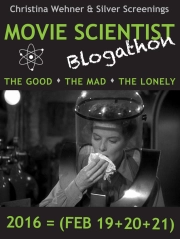There’s a joke I once heard as a child (paraphrased by me):
The earth had reached a state of perfection where scientists had solved all their problems: war, famine and hunger, global warming, disease – life was now perfect and ideal. So they sent a delegation of scientists to see God and tell him that they no longer required his services. “We can do anything you can do,” they told him. God listened to them politely.
“Name something,” they said. “Name anything and we’ll show you we can do it as well as you.”
“Why don’t you create life,” God said.
“Oh, that’s easy!” one scientist said and bent down to grab a handful of dust. God stopped them.
“Wait a moment,” God said, “Get your own dust!”
 But in all seriousness, as much as Frankenstein movies warn about trespassing on the realm of God (and if you think about it, Frankenstein’s not even in the ballpark), I never found they made a very convincing case. The pertinent message ends up being more about scientific ethics and the nature of humanity. Though, admittedly, Frankenstein does have a colossal god complex.
But in all seriousness, as much as Frankenstein movies warn about trespassing on the realm of God (and if you think about it, Frankenstein’s not even in the ballpark), I never found they made a very convincing case. The pertinent message ends up being more about scientific ethics and the nature of humanity. Though, admittedly, Frankenstein does have a colossal god complex.
But if the movies had really been about trespassing on the realm of God, there shouldn’t have been any careless accidents (like using the wrong brain?). There should have been divine retribution (the proverbial zapped by lightning). Either that or it simply shouldn’t have been possible to create life. Interestingly enough, in the 2015 Victor Frankenstein, that is exactly what happens. Victor Frankenstein creates a being that breathes, but it has no soul and Frankenstein concludes that what he has created is not really life – just a carcass with a heart pumping (or hearts, in this case).
But in the Frankenstein films, an unspoken question is asked – what makes someone alive?
In the original 1931 Frankenstein and the 1957 Hammer Studio The Curse of Frankenstein, they do succeed in creating a living human being. Both “monsters,” played by Boris Karloff and Christopher Lee, have damaged brains (caused by careless or bickering scientists and their assistants), but they feel pain, suffering, longing, confusion. But the fact that both “monsters” have damaged brains is something of a side-issue in the films. It wouldn’t have mattered if both of them had been fully functioning, thinking adult creations. Their very appearance and the way in which Frankenstein treats them would have caused problems.
In the original Frankenstein, Colin Clive plays an obsessed scientist – not so much evil as totally consumed by what he is doing. In the 1957 version, Peter Cushing’s Frankenstein is an out-and-out psychopath (like Beauty and the Beast, he’s the real monster in the story). But what they both have in common is a casual attitude towards their creation. In fact, that is part of the problem. They think of the “monster” as their creation – something to experiment upon, study and destroy in a way that wouldn’t be acceptable if their creations were animals. They talk of creating life, but they don’t treat them as life.
Actually, it makes me think, of all things, of George Bernard Shaw’s play “Pygmalion.” Because Henry Higgins thinks he’s created Eliza Doolittle, the perfect lady, he thinks he can control her and treats her as though she had no feelings. Except in the end she asserts her independence and waltzes out. But she has options in life that aren’t exactly available to Frankenstein’s monster.
So, if they’re not really trying to create life, what are they trying to do? Science for self-aggrandizement and fame – like a Greek hero who wants to be remembered after he has died? To exercise control and power? The thrill of discovery and the challenge? Maybe all these reasons and more? Perhaps they (or at least Colin Clive’s Frankenstein) even once wanted to do good.
But the Frankensteins’ treatment of their creations tends to be little better than their treatment of other people (especially in the case of Peter Cushing’s Frankenstein), who are the little people in their personal drama. Oddly enough, the creation of life ends up resulting in the isolation of the creator (I had to get the theme of loneliness in there somehow!) and a lack of sympathy for those already alive. In Frankenstein, creating life ends up a kind of nihilism.
This is my contribution to the Movie Scientist Blogathon, hosted by myself and Silver Screenings. Follow the links for the rest of the entries: Day 1 was devoted to Good Scientists, Day 2 went to the Mad ones, and Today comprises the Lonely ones.








Film Music Central
February 21, 2016 at 9:47 am
I always feel horrible for the monster in the 1931 film. Frankenstein’s monster is convinced that because a deformed “criminal” brain was used, then the monster MUST be evil. And yet we (the audience) can clearly see that the monster is confused and terrified and only wants kindness. The question of what makes life (in movies like these) just fascinates me.
LikeLiked by 1 person
christinawehner
February 21, 2016 at 1:01 pm
I know what you mean about feeling so badly for the monster – and the ending was devastating with the fire. I was a little shocked after first seeing it because I didn’t expect an early horror film to move me so much.
Boris Karloff was incredible, wasn’t he? The way he showed his longing for kindness and yet still managed to be frightening.
LikeLiked by 1 person
Film Music Central
February 21, 2016 at 1:02 pm
He was amazing! Especially since he doesn’t really speak, his looks and movement say everything.
LikeLiked by 1 person
christinawehner
February 21, 2016 at 1:16 pm
So true…it’s a shame horror wasn’t taken more seriously (still isn’t, really) so that he could have earned an Academy Award nomination.
LikeLiked by 1 person
Film Music Central
February 21, 2016 at 1:18 pm
He never did? That’s a crime, yea, horror and sci-fi still aren’t taken that seriously, which is such a shame
LikeLiked by 1 person
Silver Screenings
February 21, 2016 at 11:28 am
You raise some valid questions: What makes someone (something) alive? What is the purpose of “creating” life? What’s the end game?
These are the types of questions the best sci-fi literature and movies cause us to ask, in my opinion. The 1931 Frankenstein is an unsettling, creepy movie, but it’s not just for the sake of being “scary”. It asks the larger questions of life – even though, as you pointed out, creating the monster seems to have been a nihilistic project.
Great choice for the blogathon! I was looking forward to reading your thoughts on this film. 🙂
LikeLiked by 1 person
christinawehner
February 21, 2016 at 1:10 pm
Thank you so much!
That’s a great point and I so agree about the best sci-fi and the questions it asks! Even today, it seems like sci-fi doesn’t get the credit it deserves for being a thoughtful and serious genre. But I wonder if the very sci-fi veneer that earns condescension is what makes those questions more relatable or somehow palatable…as opposed to a straight-up drama?
In a perfect world, where sci-fi was appreciated, I always liked to imagine Boris Karloff being nominated or evening winning an Academy Award for that performance in 1931. 🙂
LikeLiked by 1 person
FictionFan
February 21, 2016 at 1:47 pm
Great post! In the same odd way as it made you think of Eliza Doolittle, it made me think of the fantastic episode in Star Trek The Next Generation where scientists want to disassemble Data to see how he works so they can replicate him, and Captain Picard has to prove to a tribunal that Data is in fact “alive” and therefore has rights. It’s a fascinating question – what does qualify as life, and at what level of sentience does a being have rights? Oh dear, now I want to re-read Frankenstein…
LikeLiked by 1 person
christinawehner
February 21, 2016 at 3:00 pm
Thanks! Yeah, Frankenstein has been sitting on my bookshelf and sort of winks at me whenever I walk by. 🙂
I have heard of that episode, but never seen it. What a great example, though! It brings up the other issue of what rights pertain to life when it is in existence.
LikeLiked by 1 person